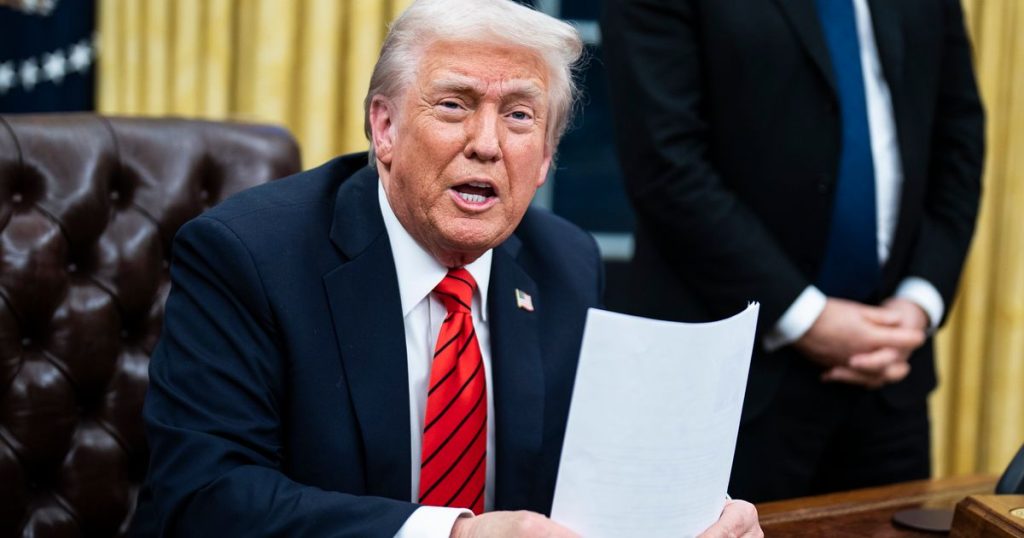The Wall Street Journal recently published a scathing editorial criticizing President Donald Trump’s decision to impose a 25% tariff on all aluminum and steel imports. The editorial warns that this move risks repeating a mistake from Trump’s first term, which the Journal argues was detrimental to the broader U.S. economy. While domestic steel producers may benefit in the short term, the Journal highlights the negative consequences for companies that rely on steel, as higher costs lead to layoffs and reduced competitiveness in the global market. The editorial describes the policy as “political rent-seeking at its most brazen,” accusing Trump of prioritizing the interests of a select few over the many. It also criticizes Trump’s dogmatic approach to tariffs, which the Journal claims is impervious to evidence or reason. The editorial concludes by urging readers to consider the full story beyond Trump’s rhetoric.
Trump signed the executive orders imposing the tariffs on Monday, framing the move as a necessary step to bring America’s industries back home. He claimed that the U.S. had been “pummeled by both friend and foe alike” in trade, suggesting that the tariffs are a means of leveling the playing field. However, the Journal’s editorial board disputes this narrative, arguing that the tariffs will harm American manufacturers and workers in industries that depend on steel. The editorial points out that while steel producers may see short-term gains, the long-term consequences for the economy will be far-reaching and damaging. The Journal also criticizes Trump’s unwillingness to consider the evidence against tariffs, which it says undermines his administration’s credibility on economic policy.
The editorial further emphasizes the potential impact of the tariffs on U.S. trade relationships with key partners. Canada, Brazil, Mexico, and South Korea are among the largest sources of steel imports to the U.S., and the tariffs are likely to strain relations with these countries. The Journal warns that such measures could lead to retaliatory actions from trading partners, further destabilizing global markets. It also notes that the tariffs will disproportionately affect American consumers and businesses that rely on steel, leading to higher prices and reduced competitiveness. The editorial amounts to a sharp rebuke of Trump’s economic strategy, accusing him of pursuing policies that benefit a narrow sector at the expense of the broader economy.
In addition to criticizing the steel tariffs, the Journal’s editorial board has also recently condemned another Trump administration proposal: the creation of a sovereign wealth fund. Last week, the board published a separate editorial arguing that the idea “deserves to die in Congress” and predicting that it would “destroy more wealth than it creates.” This suggests that the Journal is increasingly skeptical of Trump’s economic agenda, viewing it as misguided and harmful to long-term prosperity. The editorial board’s consistent critiques of Trump’s policies reflect a broader concern about the administration’s approach to trade and economic governance.
The Journal’s editorial on the steel tariffs also serves as a reminder of the ongoing debate over the efficacy of protectionist policies. While Trump and his supporters argue that tariffs are necessary to protect American industries and jobs, critics like the Journal contend that such measures often do more harm than good. They point to historical examples, such as the 2002 steel tariffs imposed by President George W. Bush, which ultimately led to widespread job losses in downstream industries. The editorial warns that Trump’s tariffs are likely to follow the same pattern, undermining the very industries and workers they are intended to support.
In conclusion, the Wall Street Journal’s editorial presents a compelling case against Trump’s steel tariffs, arguing that they are based on flawed assumptions and will have far-reaching negative consequences for the U.S. economy. The editorial criticizes Trump’s dogmatic approach to trade policy, which it claims is resistant to evidence and reasoned argument. By framing the tariffs as a form of political rent-seeking, the Journal highlights the unequal distribution of benefits and the broader harm to American businesses and consumers. The editorial also raises important questions about the long-term impact of Trump’s economic policies and their potential to destabilize global trade relationships. As the debate over the tariffs continues, the Journal’s critique serves as a stark reminder of the risks associated with protectionist measures and the need for a more balanced approach to trade policy.
